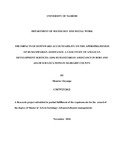| dc.description.abstract | The term downward accountability is used to describe the extent to which an NGO is accountable to the intended beneficiaries. Recent studies (Featherstone, 2013: 27) have shown that downward accountability is important in delivery of humanitarian assistance. However, other scholars like Riddel (1999: 223) have questioned whether Humanitarian Assistance Agencies are responsible for exaggerating the importance of downward accountability in delivery of humanitarian assistance. This is interesting because on one hand, there is recognition that downward accountability is important while on the other there are questions around the essence of the mechanisms. The purpose of this study was therefore to assess the use of these mechanisms and their impacts on the appropriateness of humanitarian assistance. The study focused on Anglican Development Services humanitarian assistance programs in 2011. Two locations were compared, one where the mechanisms were applied in Adadi with another where the mechanisms were not applied in Bori. It was guided by the following objectives: To describe the successes and failures of downward accountability mechanisms on the appropriateness and effectiveness of humanitarian assistance; to assess the socio-cultural barriers to the establishment and implementation of downward accountability mechanisms and identify the measures that can be put in place by stakeholders to improve the voice and bargaining power of disaster affected communities. It adopted a case study approach and was based on three theories: Voice, exit and loyalty theory; Resource dependency theory and principal agent theory. Primary data were collected from 94 households out of the sampled 98 households using interview schedules. The 94 households represented a response rate of 95%. The study also utilised key informant interviews, direct observation and group interviews as methods of data collection.
The research findings suggest that where the three pillars of downward accountability mechanisms- information sharing, complaints and response and participation were applied in Adadi, they were effective in enhancing appropriateness of humanitarian assistance through improved targeting and meeting the needs of the target group at 74%, 85% and 77% respectively. The mechanisms also improved beneficiaries’ ownership of the relief process at 64%, 74% and 72% respectively. However, only participation was seen to enhance sustainability of programs at 85%. These results were not evident in Bori where the mechanisms were not applied showing that the existence of the mechanisms helped in enhancing appropriateness of assistance. On the other hand, the mechanisms were not effective in helping beneficiaries to make demands on Humanitarian Assistance Agencies or address fraud and mismanagement of aid both of which scored 32% and below. On the second research question, the study revealed that the top three socio-cultural barriers to the implementation of downward accountability mechanisms were language barrier at 89%, trusting the committee for representation (87%) and culture of being grateful/not questioning those who assist (81%). Under the third research question, the study found that the three key indicators of success of the mechanisms included availability of signed distribution lists (98%), community knowledge and participation in developing the targeting criteria (89%) and evidence of complaints made and response to the complaints (77). These were not evident in Bori where the mechanisms were not applied indicating that the downward accountability mechanisms deliver results in enhancement of aid appropriateness and effectiveness. The key recommendations from the study are; Future humanitarian responses should use a combination of accountability mechanisms to ensure maximum success; Informal complaints and feedback processes should be adopted in highly illiterate communities; Pictorial information should be used to depict key program details like relief entitlements. | en_US |



